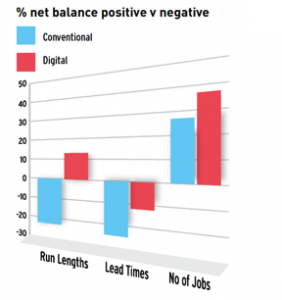The print industry is faced with enormous structural change ranging from consolidation, an assault from digital media, constant downward price pressures and challenging customer demands.
These insights were revealed at the Konica Minolta User Community Prokom Conference 2019, which was held over two days in Valencia, Spain from 5-6 June. It focused on the traits of successful companies and how some Prokom members are leading the print industry with a powerful mix of insight, innovation and transformational change.
The latest drupa trend report highlights the stark reality of the challenges facing the print industry and how printers need to take the plunge and transform their business.

In response to this challenging environment, the Prokom conference focused on the traits of successful companies and how they are evolving and adapting.

Peter Muir, CEO of Bizucate, discussed the importance of facts and learning to understand what’s going on in the wider world around customers and prospects. He explained that it was critical to identify a niche market, explore how to take control of that market, bring the customers to you and be the resource for that marketplace. Research is critical to verify that this is the right growing market, so you can create sticky solutions.
Peter explained that you can’t have an aversion to risk as $680 billion is spent on innovation every year and 85% is not successful. There are 30,000 new product launches each year and only 15% are successful. To de-risk this situation, people have to get curious about the why, which has three elements; the functional, emotional and social.

Printers need to gain profound understanding of customers’ thoughts, feelings, and experiences when choosing and using products or services. They need to explore circumstances around customers’ buying decisions and recognise forces that influenced customers’ decisions. This should all be communicated by collecting stories, not statistics.
Graham Reed from the Marlixia group and Mark Hanley from IT Strategies rounded off the first day. Reed delivered a compelling message that technology is not enough for printers and a price proposition was an ever-decreasing circle. He explained how he had built his business from the point of near failure to a turnover of over R142 million (£8 million) by using a range of cross-media tools to leverage his print sales. Hanley provided an insightful view of the future trends in print. One of his key points was the fantastic potential for sheetfed UV inkjet in the market gap between toner-based technology and web-based inkjet.
Professor Julian Birkinshaw from the London Business School kicked off the second day by focusing on the playbook for companies that succeed in adapting.
The four key elements are:
1. Agile strategy.
2. Fluid structure–adhocracy.
3. Unreasonable people.
4. Ambidextrous leaders.
Birkinshaw discussed leadership skills in a digital world and the most important attributes for the future leaders (% very important or critical).
• Defining and articulating a sense of direction 90%.
• Acting decisively when there is uncertainty 85%.
• Getting rid of obstacles and enabling subordinates 68%.
• Managing the flow of information 43%.
• Being a recognised expert in technical areas 30%.
• Monitoring the performance of subordinates 19%.
• Overseeing the formal processes and rules 9%.
He concluded that it was critical for leaders to be in tune with what employees wanted, which was worthwhile work, and clarity on the ‘why’. They needed the space to find their own way and the right support with the appropriate recognition and praise. However, what they often get is confusing or unclear objectives, micro-management and meddling, lack of concern and limited feedback.
What followed were great examples of Prokom members exhibiting all the attributes of successful growth and profitability. Mark McIvor from the C2 group explained his roadmap for successfully scaling a small SME commercial print business by investing in a new MIS and a new marketing team.
Jeremy Bacon from the Sherwood Group gave delegates a blueprint for how they have diversified into the packaging market. The Sherwood group differentiates itself by being active in three different markets: greeting cards – 50%, commercial print – 40% and packaging – 5%. He focused on the importance of the strategic tools it uses to understand the behaviour of market leaders, conducting competitor analysis to track the winners and losers.
He stressed the importance of knowing:
• Who are our competitors?
• What threats do they pose?
• Economic performance.
• Core competencies.
• Strengths, weaknesses, opportunities and threats.
• Marketing mix (7P’s).
• Opportunities to pre-empt and gain competitive advantages.
• Business strategy.
Kevin Abergel from MGI and Charlotte Graham Cumming from Ice Blue Sky focused their attention on ‘What brands want’ and how printers need to adapt to the changing demands of consumers and marketers. Print embellishment and adding value to the printed product were seen as essential requirements along with creative ideas and helping smaller brands with marketing automation and multi-channel communications.
To round off the conference and to get delegates inspired they were treated to two sessions. The first was from Lee Warren – ‘How to persuade anybody to do anything – well almost’, followed by Mark Denton the round the world yacht race skipper with ‘resilience in the eye of the storm.’ Denton told the compelling story of how he took a team of rookie sailors and sailed around the world battling all the odds to finish 3rd.
Four Prokom members were recognised with a Prokom Innovation Award, sponsored by EFI, for their outstanding entries this year. They were Jingpin Daoyuan Culture Communication Company, Sri Sivarama Digital Press, Langhorst Design and Print and Huizhou IDprint Technology Company.

Prokom members left the conference ready and motivated for change. They were challenged at the conference with a 123 scenario – to come up with three new things they are going to start, two things they are going to stop and one thing they are going to continue to do based on what they have learnt at the conference. They were also tasked with introducing these things within 72 hours of returning to their business.
Toshitaka Uemura, general manager, Konica Minolta Inc said, ‘We hope all the conference delegates have been inspired to deliver even greater success for both themselves and Konica Minolta.’
PROKOM www.prokom.org





